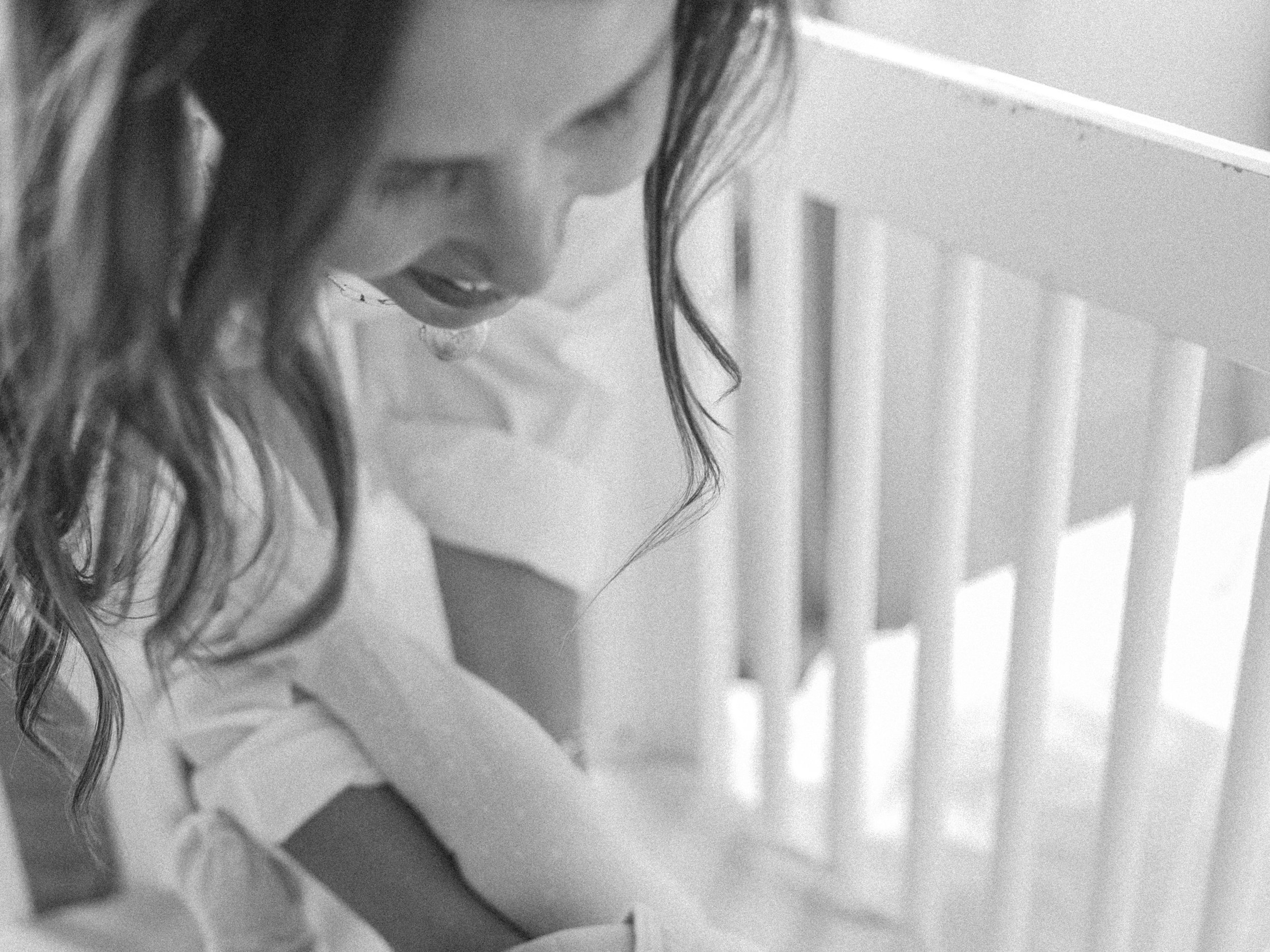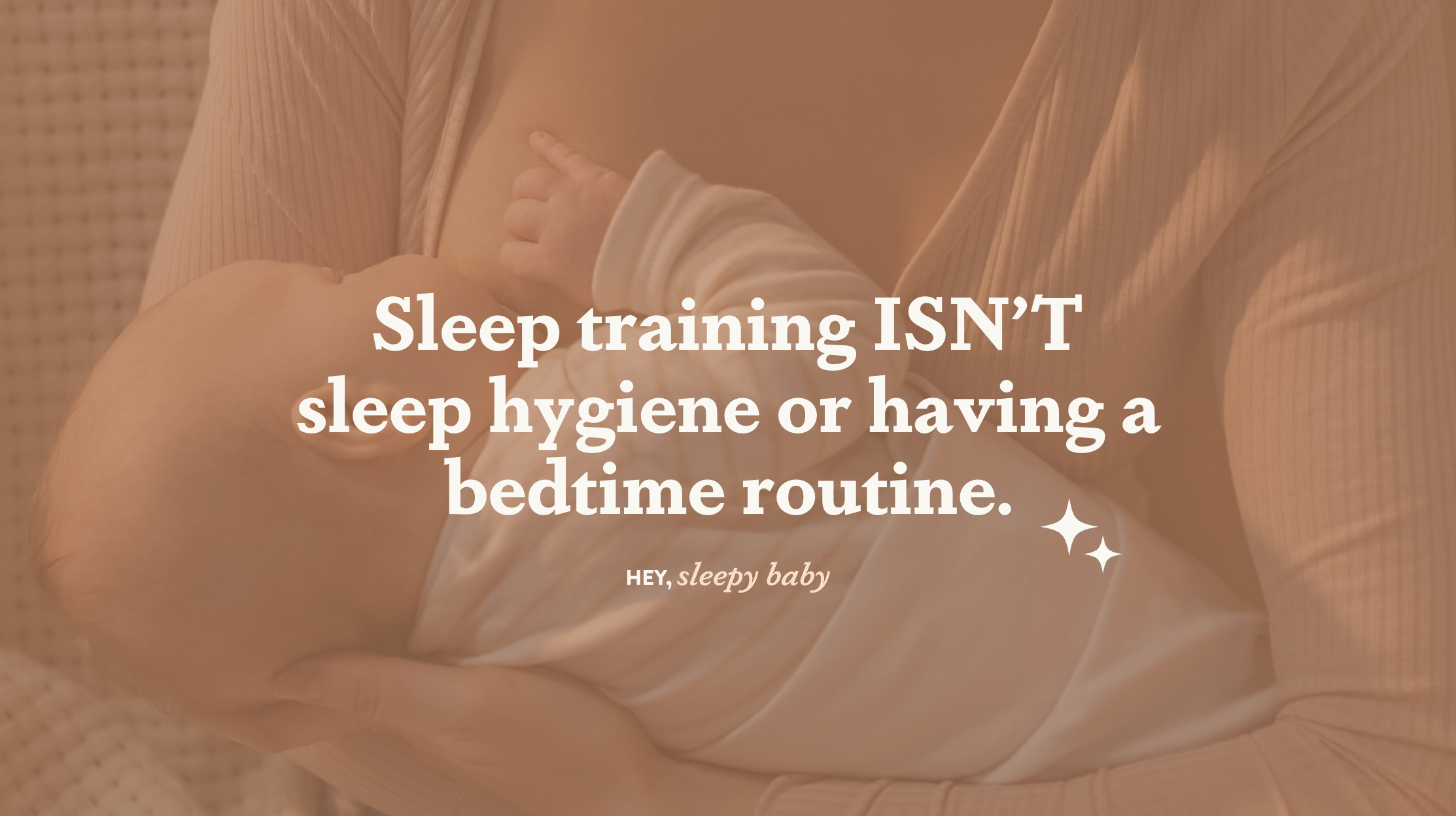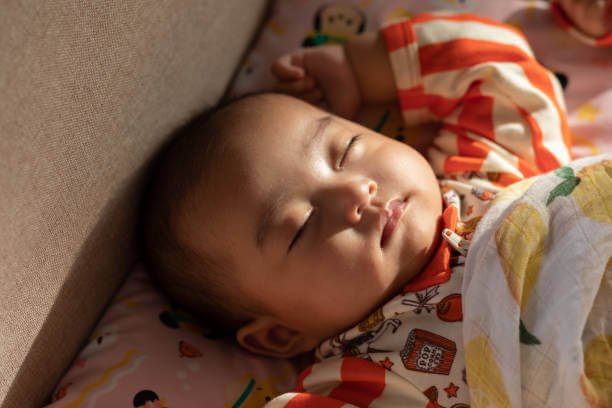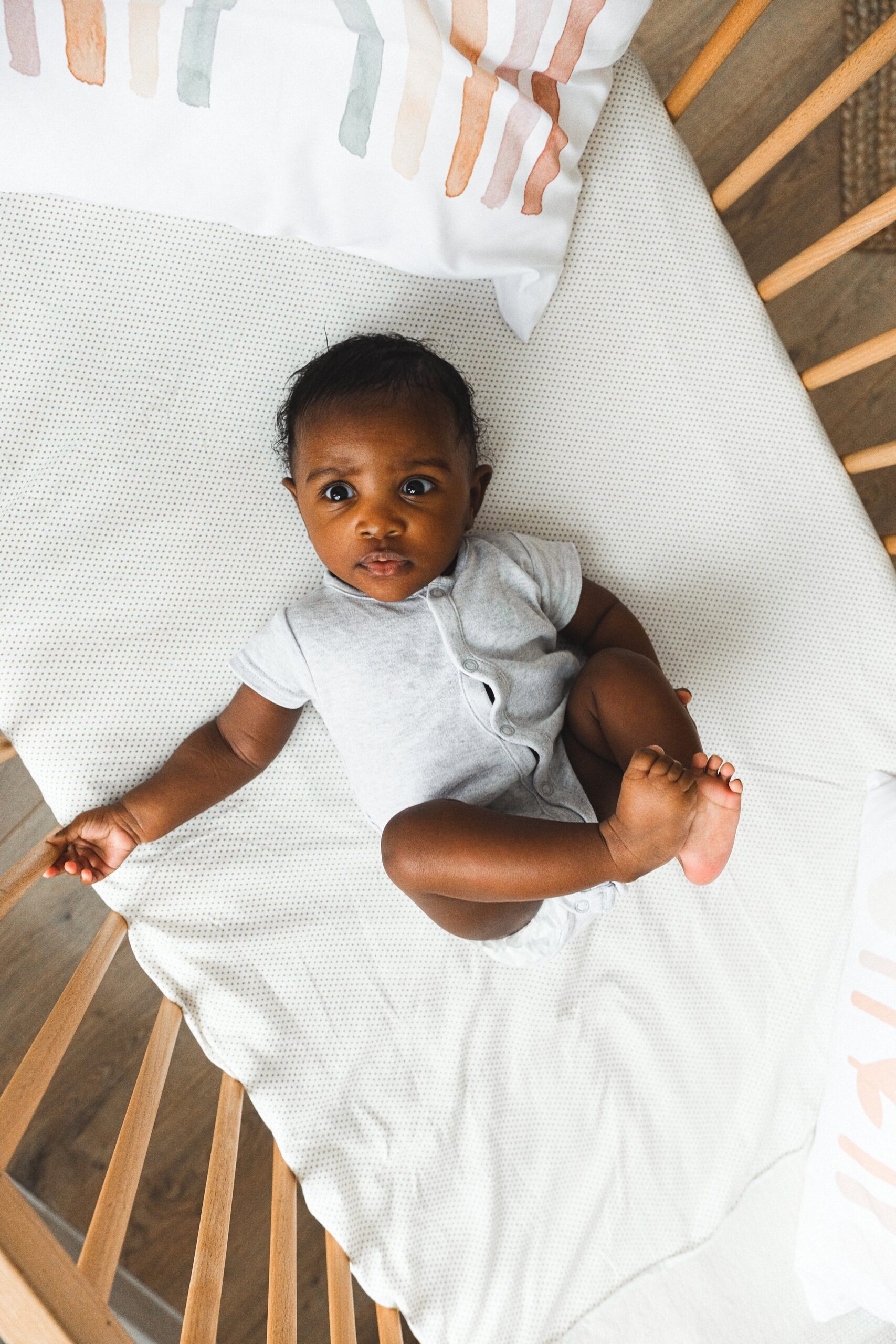I'm Rachael
Mom of 3 & Baby Sleep Expert with Big Sis Energy
& I’VE DONE ALL THE RESEARCH FOR YOU ALREADY.
Better sleep for the entire family
BROWSE COURSES
hey!
what is “sleep training” and what are the alternatives?
in this post:
As the founder of a baby and child sleep company, I get a ton of questions about sleep training. From ‘What are your views about sleep training?’, ‘Is sleep training bad?’, ‘Can I sleep train my baby at 3 months?’, ‘Should I sleep train my baby while teething?’ to just straight up ‘WHAT EVEN IS SLEEP TRAINING?’ You name it and I can assure you, I’ve been asked it! Sleep training as a concept is rife within the parenting world. It’s divisive, controversial, hugely popular yet polarizing, and ingrained within Western society as a “must do” part of parenting. This blog is a one-stop shop for the @heysleepbaby approach and view of the complex world of sleep training!

when did sleep training start?
First let’s get a little context. It may seem like it’s been around forever, but the origin of “sleep training” in terms of behavioral/ crying methods isn’t all that old. The practice has been around for less than 150 years. Before that, most infants slept close to or with their parents. One of the earliest advocates of “heavily regulated infant care” was Luther Emmett Holt, a physician who strongly encouraged parents to implement strict routines related to feeding and sleep; many practitioners in the sleep training industry still follow his standards to this day. In the 1890s, Holt claimed that “…by the age of 3 months, and at most 5 months, all infants can go without feeding between 10 pm and 6-7 am. Holt identified night feeding as the primary cause of wakefulness and disturbed sleep” (Tomori, et.al, 2018). Holt also advised parents that “in order to be effective, crying it out should last for 3 hours.”
Over time, Holt passed the sleep training baton off to a man in academia named John Watson, who took Holt’s recommendations a step further to ensure that “routines and regulation” were implemented from day one, as to not interfere with a mother’s additional responsibilities, such as maintaining the household, and caring for her husband. Fast forward about one hundred years to the 1980s and we have the introduction of the first “programs” or instructions for how to carry out “sleep training” from 2 male doctors. One was extinction (cry-it-out) from Marc Weissbluth (author of Healthy Sleep Habits, Happy Child), who advised simply putting the baby in their crib and closing the door until morning, and the other was the “Ferber Method” popularized by Richard Ferber, who advocated what he dubbed “controlled crying” or letting a child cry for increasing increments while intermittently checking on them. These two methods are still the most popular today, with hundreds, if not thousands, of programs “rebranding” CIO or Ferber to sell sleep training to parents.
Sleep Training – What it is and What it isn’t
Sleep training has become so controversial because of the confusion surrounding it. Terminology is constantly used in different ways to refer to different elements of baby sleep. This leads to parents’ confusion and lots of people asking ‘If I do this …. is it sleep training?’ So let’s clear it up!
In my opinion, sleep training IS a behavioral modification technique and includes any method that instructs parents to ignore the crying or cues of their infant and to withhold the comfort and reassurance they would normally offer their infant during the day. There are two popular techniques. The first and most controversial is extinction or cry it out (CIO), the origins of which I mentioned earlier. This method instructs parents do a bedtime routine, put their baby in the crib, close the bedroom door and not return again until morning regardless of how much/ how often they cry out. The second most common sleep training method is “graduated extinction” or “controlled crying”, which was introduced by Dr. Richard Ferber and is also known as the “Ferber Method.” This method instructs parents to do the same thing, but to go back into the baby’s room in increasing increments of time but then leave again for 5/10/15/20 minutes etc until the baby eventually falls asleep. Most current sleep training methods use a version of the Ferber Method, calling the timed checks anything from “pop ins” to “timers” or “check ins.” It’s important to know that Ferber himself has since said his philosophy has been misunderstood and misapplied, and he wouldn’t recommend it for every child who didn’t sleep well.
There are other methods of sleep training of course, all with varying degrees of crying and parental involvement. There’s the “Chair Method” where the parent starts sitting by the infant’s crib and moves further away every couple of days until they are outside the door. There’s the “Pick Up Put Down” method, where parents are able to pick up their baby and soothe them whenever they cry, but then put them back down in the crib once they’ve stopped crying (this is often repeated dozens of times in one night when first starting), and others variations of these.
Sleep training ISN’T sleep hygiene or having a bedtime routine. I see this misconception a lot. Parents think that anything that involves optimizing your baby’s sleep or having routines, following wake windows, etc. means they are “sleep training” and fear the negative connotation of the term. Whether you’re trying to implement loose schedules, introducing a bedtime routine, adding sleep associations, soothing your baby while in the crib, making changes to their sleep space, or having another caregiver respond, know that these things are just tweaks made to optimize your baby’s sleep. Tuning into your baby’s needs and preferences and taking these things into consideration is connective, responsive, nighttime caregiving. The very opposite of sleep training!
Why is Sleep Training so Controversial?
There is so much information and advice on Instagram, Tiktok and Google that is completely unregulated regarding baby sleep. Even pediatricians get little to no formal training in infant sleep (or lactation) and give outdated advice to parents about sleep training. Much of it is not based on any evidence of biologically normal baby sleep or infant development, yet it gains so much attention and has a great influence on parenting decisions for many families.
Sleep training is hugely popular in the West, with the golden ticket of parenting being to have a baby who sleeps through the night. However, in the rest of the world, this isn’t a thing! Sleep training and the hyper-fixation on baby sleep is a social construct. It’s completely normal for babies to wake and feed throughout the night in their first year and beyond. In fact, it’s healthy: many experts agree that rousing throughout the night can help protect against SIDS (McKenna 2020).
As people begin to talk more with each other (thanks to social media) about sleep training, more questions are being raised about the potential long-term effects. A quick search on Google will reveal how more people are asking the question ‘Is sleep training bad for babies?’
There are bold claims made from both “camps” as far as sleep training and the potential downsides. The result of sleep training falling out of favor with some is that the marketing in the baby sleep industry has had to shift and disguise sleep training packages in fancy wrapping. Most of the time these sleep training packages are sprinkled with words like ‘gentle’ and promise results within a few days. They mention 2-3 days of crying and then wonderful independent sleep for the rest of your child’s life. They promise you that even though it feels hard you are truly giving your child a gift. They make parents feel guilty that they are somehow setting their children up for failure if they don’t teach them this skill and that they should put headphones in, have a drink, go for a walk, and let their partner respond to get through it. They justify the crying by saying that infants left to cry are simply protesting, throwing a tantrum, pissed off, learning to self-soothe, or manipulating you. These things are simply false and not up to date with what we know about infant brain development. This is the problem with having such an unregulated industry and part of the reason why sleep training is such a divisive, controversial topic.
♬ original sound – Rachael | Heysleepybaby
does sleep training work?
Some people do report that sleep training works well for them. If that’s the path they choose and it works for them, then that’s great! However, it’s not the full picture. There are a few things to consider here. One, what do we mean by “work?” Research shows that sleep trained babies aren’t sleeping all that much more than babies who have not been sleep trained. They simply stop signaling for their parents when they do wake. So if you’re worried about your child getting enough sleep and think sleep training will make them healthier or get more restorative sleep, that’s not likely going to happen. Sleep training may get the parent more sleep because the child stops signaling, though research suggests that even that is a short-lived benefit for most. One study out of Canada showed that only 14% of parents reported that controlled crying eliminated all night wakings, and nearly half said it didn’t reduce wakings at all. In addition, it wasn’t a one time thing the way most programs advertise: parents tried controlled crying between two and five times in their baby’s first year. A 2006 review of 52 studies found that more than 80% of children who received a sleep intervention in infancy (including strategies other than cry-it-out methods, like implementing a bedtime routine) demonstrated “clinically significant improvement that was maintained for three to six months”. That’s not a very long time for something that’s supposed to give the “gift” of life-long healthy sleep habits.
It’s also important to note that the data we do have on sleep training and potential long-term benefits or harm is not well researched. In that same 2006 review, researchers noted that of the 52 studies considered, the researchers found only 11 of them to have high-quality data. There’s simply a lot we do not know and may never know about sleep training and the potential effects it has on infants.
What are the Alternatives to Sleep Training?
Some of the most common things I hear are ‘I don’t want to sleep train but I don’t know what else to do’, or ‘Sleep training didn’t work but I don’t know where to turn’. Believe me, I have been there! I sleep trained my first because I thought that’s what you had to do! It was all I knew and was exposed to. Everyone asked me about his sleep, whether he was a good baby or if was he sleeping through the night. I was up EVERY night on Google searching for the answers. ‘What age should I sleep train my baby?’, ‘Why is sleep training important?’, and then eventually after weeks of being completely stressed out and anxious over his sleep, ‘Why is sleep training not working?’. I took his sleep so personally and when the expensive sleep training program didn’t work, I thought it meant I had failed. It contributed to postpartum depression and robbed me of the joy of the first year of motherhood.
What do you do if you don’t want to sleep train? When I had my second child, I was determined I wouldn’t let her sleep dictate everything. I started to learn about biologically normal infant sleep and took courses as a sleep coach and my relationship with my second child’s sleep was so different. In reality, my daughter was a worse sleeper than my son, she woke more frequently and took longer to sleep through the night BUT I knew this was normal! I had no guilt, no worry, no stress, much more enjoyment and I wouldn’t change that for anything. It is what drives me to do the work I do- to spread the word that there is an alternative and that you don’t HAVE to sleep train!
So the first alternative to sleep training to note is that you don’t need to do anything. Your infant will sleep through the night at some point even if you don’t actively try to change their sleep (unless something is medically going on with them). Contrary to what the sleep training propaganda has you believe, you will at some point have an independent sleeper!
However, motherhood is exhausting and sleep deprivation is incredibly tough. So the good news is that there is a huge gulf between crying it out and waiting it out. Some parents decide to cosleep or bed share to get the most sleep. It’s so important to know how to do so safely. If you don’t want to cosleep but also don’t want to sleep train, focus on routines, sleep hygiene, and making sure there aren’t any medical reasons your baby might be struggling with sleep. There are lots of things you can do that will help to optimize your baby’s sleep (I outline all of this and more in great detail inside this popular freebie guide):
-
structuring the day to establish a strong circadian rhythm
-
maximizing the release of melatonin with lighting (dim at night, bright natural sun during day!)
-
using rough and tumble play or other sensory strategies to help fill up their sensory cup before bed
-
increasing connection time before bed
-
ruling out red flags
-
layering in sleep associations
-
building a strong bedtime routine
-
creating an environment conducive to sleep
All these things will help with your baby’s sleep hygiene and as a result, help to improve your baby’s sleep.
what makes the hsb approach different from sleep training?
You might be wondering what makes our approach to sleep different from sleep training. It’s hard to know who to trust in the “wild west” of the baby sleep industry. We aren’t a sleep training program and we don’t give any false promises or crazy guarentees. Our approach isn’t a behavioral method of sleep training. It focuses on looking at your entire family unit to find solutions that get everyone the best sleep possible, while respecting your child’s developmental and emotional needs. This is a big difference because most traditional sleep training programs are prescriptive and assume every child and family will have the same needs. The popular methods our there are pretty old-school, and many sleep training programs have a one-size-fits-all approach. There are muddy terms like “gentle” and “no cry” (though the “no cry” methods are often only “no cry” for easy-going babies). Temperament is rarely discussed. Culture is rarely acknowledged. If we accept that all babies are different in every other context, how could we expect a one-size-fits-all approach to work for sleep? Not here! We believe each child and family is unique and there’s no one “right” path to getting better sleep. You can read more about us here!
If you would like more information about maximizing sleep without sleep training then check out all the free resources on my Blog and Instagram.
For soon-to-be parents and parents of a newborn, you will want to check out our Baby Bundle. The Baby Bundle is everything you need to set yourself up for the newborn stage. The only newborn sleep course The Newborn Masterclass: you’ll need. This class helps new parents stress less about sleep, so they can actually ENJOY the newborn stage! It also includes The Ultimate Crib & Bed Guide: A REALISTIC, stress-free approach to introducing some independent sleep for your little one in a crib or floor bed without sleep training.
If you are looking to move on from cosleeping or to make other supported changes to your little one’s sleep, then check out our Tender Transitions Course. This brand-new course combines 2 of our most popular workshops ever, plus a whole module of new material on sleep, attachment, and mindset. This 3-Module Course teaches you step by step how to move away from any sleep sitch that’s no longer working for you- whether it’s bouncing or rocking to sleep, feeding to sleep or cosleeping/ bed sharing.
You can also book with one of our world-class sleep experts one on one to get support for your family!
binge reads
We think you'll love these
You deserve to the
baby stage, not just "survive it."
And you DON'T have to sacrifice your values, ignore your instincts, or force yourself to follow a method you don't align with just to get your baby back to sleep.
I’m here to help you create a restful, sustainable sleep environment that honors both your baby’s needs AND your own (without the stress OR the guilt!) because, no, you don’t have to choose between the two.
enjoy!
BABY SLEEP COURSES →
BABY SLEEP CONSULTS →
Wish you could help your baby sleep better without resorting to sleep training? Download my FREE guide to a good night’s sleep and learn 8 simple, science-backed tips for supporting your child’s needs.
Traditional sleep training methods don’t have to be your solution to better sleep.
SLEEP TRAINING ISN’T THE ONLY WAY TO GET GOOD SLEEP
Hey, I'm Rachael and Hey, Sleepy Baby is for parents who want to get their nights back, without sleep training their babies.
NO ONE TOLD US POD
explorING the untold truths of parenting



